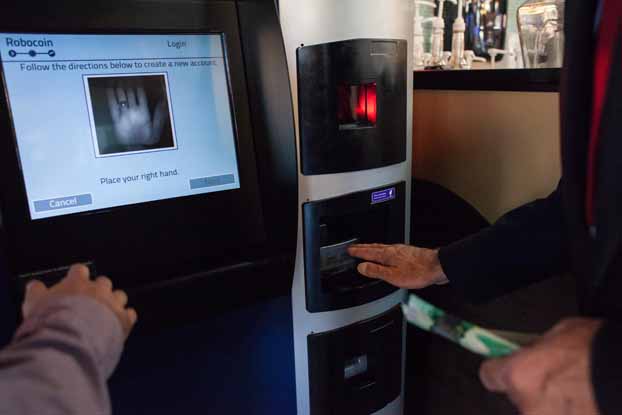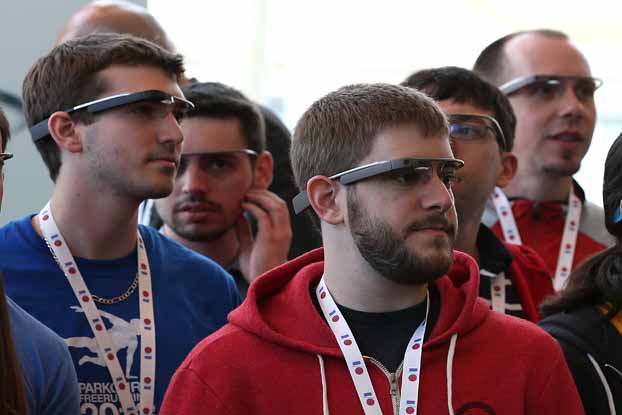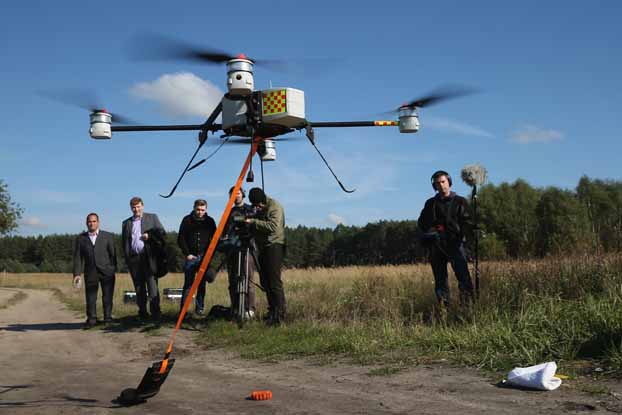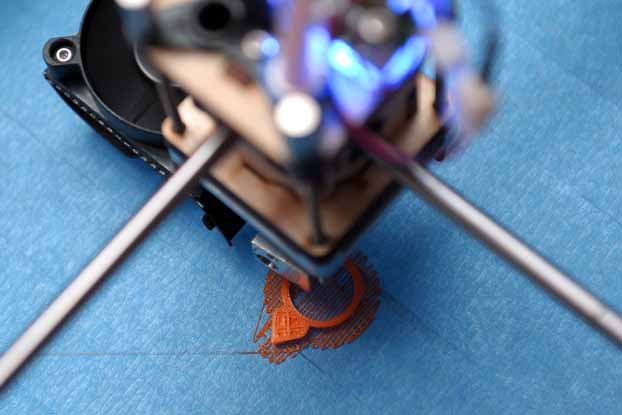7.The Technological Singularity
7.技术奇点
Artificial intelligence (AI) has come a long way since computers first made the scene. Yet we're not at the edge of a dystopian society in which the machines run amok and humankind fights for its survival. At least, not yet.
人工智能(artificial intelligence,缩写:AI)在电脑诞生后取得了很大的成就。然而我们并不是生活在反乌托邦社会,还不需要为存活而对抗抓狂暴走的机器。至少,现在还不用。

In 1993, Vernor Vinge, a math professor at San Diego State University, proposed what he called the singularity -- a time at which computer networks may become self-aware through advanced AI, and interfaces between people and computers help humankind evolve. Biological advancements may become so sophisticated that doctors can even engineer human intelligence. There is a possibility, however, that AI might allow machines to take over the world. There's no guarantee that such a scenario will really happen, and technological limitations may prevent it. Still, the idea that machines might someday decide we're irrelevant and arrange for our destruction is more than a little creepy.
1993年,圣地亚哥州立大学(San Diego State University)的数学教授,弗诺·文奇(Vernor Vinge)提出了技术奇点(singularity)的概念——在未来,计算机网络通过先进的人工智能获得了意识,并可以与人类直接连接来帮助其进化。生物学的进步如此精密,先进到医生就可以对人的智力进行改造。不过,人工智能的发展也使机器攻占世界成为可能性。我们无法确定这些事情以后是否会发生,但暂时以我们的技术水平还无法实现。不过,也许有一天,机器可能觉得人类没有利用价值就摧毁我们,想想就不寒而栗。
6.谷歌眼镜

Google Glass, the high-tech specs with a built-in camera and pop-up display, turns the idea of Big Brother on its head. Maybe the surveillance menace of the future won't be a fascist regime with spy cameras on every corner, but rather an army of geeks recording every waking moment of their lives with a nod of the head and the wink of an eye.
谷歌眼镜是一款高科技眼镜,配置了一台嵌入式摄像头和一个(位于镜框右侧的宽条状的)电脑处理器装置。它比日本兄弟公司更早推出了(高科技眼镜)这个产品。也许在未来被监视的威胁并不是来自于专制政府的间谍照相机,而是来自于一群极客们,在他们平时行走的过程中,点点头和眨下眼睛就可以获取信息了。
Aside from the inherent dorkiness of Glass, privacy is the biggest concern with the search giant's latest foray into world domination. What's to stop a Glasshead from turning on his camera in the subway, the doctor's office or the gym locker room? Several U.S. casinos, bars and movie theaters have already banned Glass. Google says that Glass isn't that creepy. For example, a small light indicates when video is being recorded and Glass wearers have to look at a subject and wink to take a picture. Yeah, that's not creepy at all.
除眼镜自身的一些缺点外,泄露隐私是搜索巨头谷歌侵占世界市场、成为霸主的最大担忧。如何阻止眼镜使用者在地铁、医生办公室或健身房更衣室使用摄像头?在美国的一些赌场,酒吧和电影院已经明令禁止使用谷歌眼镜。谷歌则表示,谷歌眼镜并不是那么可怕,比如,在眼镜录像时会有一个小灯提示,佩戴者必须看向一个物体并且眨眼才能够拍照。是啊,这难道还不够可怕么?
Another scary prospect is the combination of Glass, social media and facial recognition technology. Some app developers are excited about the prospect of a Glass app that can recognize a stranger's face and pull up information about the person scoured from their Facebook and LinkedIn pages. While Google rejects the idea of facial recognition on Glass, the company has patented eye-tracking technology that would record what ads you look at in the real world and charge fees to advertisers on a "pay-per-gaze" basis.
谷歌眼镜另一个令人担忧的性能是,眼镜可以与社会媒体和面部识别技术相结合。一些应用软件的开发者们欣喜的预计,通过制作一款谷歌眼镜软件,就可以在识别陌生人的脸之后,从脸书和领英这类社交软件上获取个人信息。虽然谷歌反驳了这种通过眼镜进行面部识别的理念,公司却已经注册了眼球追踪技术的专利,可以记录用户在生活中看了什么广告,并且向广告商按注视收取费用。
While we're on the subject of scary surveillance, let's take to the skies.
如果生活中到处都是监视,我们只能飞上蓝天了。
5.无人驾驶飞机

A CIA operator in Virginia can fly a near-silent Predator drone through the night sky of Pakistan, locate his target on a video screen and rain down Hellfire missiles from the comfort of his cubicle. While counterterrorism officials and the White House defend unmanned drones as a "cleaner" alternative to military action, the use of drones raises important questions about government-sanctioned assassination and the inevitable deaths of innocent civilians.
弗吉尼亚州,美国中央情报局的指挥人员可以舒服的坐在控制室小隔间里,指挥近乎无声的“捕食者”无人机穿过夜空飞到巴基斯坦,通过荧光屏控制飞机降落到指定位置,指挥其发射大量地狱火导弹。尽管美国白宫和反恐官员都辩称无人机只是用来”扫除障碍”而不是军事行动,但是无人机的使用还是产生了一些重要问题,像政府批准的暗杀和不可避免的无辜平民的死亡。
As scary as military drones are, people are truly creeped out by the prospect of domestic spy drones. In 2012, the U.S. Congress passed a bill allowing the Federal Aviation Administration (FAA) to draw up rules for the use of commercial and police drones in U.S. airspace. And New York City mayor Michael Bloomberg commented that the presence of drones hovering over American cities was "inevitable". Law enforcement is buzzed over the idea of trailing suspects from the skies, but privacy advocates worry that it's a small step from targeted surveillance to indiscriminate 24/7 spying on everyone.
和军用无人机一样可怕的是,人们对国内无人侦查机的使用前景感到极为恐惧。在2012年,美国国会(U.S.Congress)通过法案,允许联邦航空管理局(FAA)草拟商用和警用无人机在美国领空的使用法规。纽约市市长迈克尔·布隆伯格(Michael Bloomberg)评论道,无人机在美国城市上空盘旋的景象是“不可避免的”。执法部门想利用这项技术从空中搜索嫌疑人,但隐私权益的倡导者则担心,这样做离对所有人进行无差别的全年无休监视仅有一步之遥。
For a totally different kind of creepy, let's look at the desktop technology that promises to revolutionize manufacturing if it doesn't get outlawed first.
接下来再让我们将眼光投向桌面上的技术,虽然与无人机技术迥然不同,但同样令人毛骨悚然。这项科技承诺将革新制造业,但很有可能在那之前它就已触犯了法律的底线。
4.3D打印机

The MakerBot Replicator 2 offers the remarkable ability to print out a 3-D plastic model of just about anything you can imagine: a child's toy, a gear for a wind turbine, or a perfectly rendered model of your own butt. Desktop 3-D printing is undoubtedly a great leap forward for small-scale manufacturing, but it's also a potential boon for thieves and low-budget terrorists.
3D打印机MakerBot Replicator 2的神奇之处就在于它能够打印出任何你能想到的塑胶模型,例如儿童玩具、风力涡轮机的齿轮、或是与你自己的臀部完美贴合的臀模。3D打印技术无疑是小型制造业的一大突破,但是,同时这也给小偷和没有太多预算的恐怖分子带来可趁之机。
In 2011, an enterprising gang of crooks used a 3-D printer to replicate the plastic front of an ATM terminal. By placing their fake terminal on top of a real cash machine, they were able to skim unsuspecting victims' ATM cards and steal more than $400,000 from their accounts.
2011年,一个居心不良的犯罪团伙利用3D打印机仿制了ATM终端机正面的塑料部分。他们把假终端安放在提现机的真终端上面,轻而易举的读取了毫无防备的受害者的信用卡信息,最终盗走了40余万美元。
But the real scary prospect is terrorists or fringe groups using 3-D printers to build guns, bombs and other weapons with nothing more than downloadable files. In 2013, a University of Texas law student Cody Wilson announced the creation of the Liberator, a fully functional .380 caliber handgun made entirely on a 3-D printer. The fact that it was plastic raised the fright factor, since it could conceivably elude metal detectors. Wilson summed up the threat nicely to Forbes magazine: "Anywhere there's a computer and an Internet connection, there would be the promise of a gun."
更可怕的是,只要拥有可下载的文件资料,恐怖分子和边缘群体就能利用3D打印机制造出枪支、炸弹等武器。2013年,德克萨斯州的一名法学系大学生科迪·威尔森(Cody Wilson)发布了他的作品“解放者”,这是一款完全靠3D打印技术制成的功能齐全的380口径手枪。这把手枪的塑料材质正是令人恐惧的原因——它能轻松躲过金属探测仪的搜查。威尔森在福布斯杂志上很好地归纳了这项技术的可怕之处:“只要有一台能联网的电脑,就能制造出枪支。”
Thanks, Cody! While we're on the topic of really great ideas with potentially horrible consequences, let's talk driverless cars.
感谢科迪!谈到这些绝妙发明的可怕潜在威胁,又怎能不说到无人驾驶汽车呢。
审校:Fiona 校对:落花生 编辑:Freya然
















